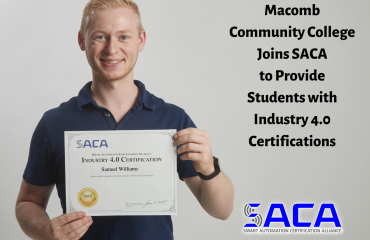
It’s no secret that United States manufacturers still struggle with an ongoing labor shortage. Those unfamiliar with the manufacturing “skills gap” might assume that it’s a result of the upheaval that occurred during the COVID-19 pandemic. However, the problem existed long before 2020.
For many years, manufacturers have encountered difficulty filling open positions, particularly for jobs that require highly technical skills. The industry-wide embrace of advanced automation technologies, often referred to as “Industry 4.0,” has created a growing demand for highly skilled workers, but the supply of such workers has yet to catch up.
In fact, a 2021 study by Deloitte and the Manufacturing Institute projected that more than two million manufacturing jobs could go unfilled by the end of this decade. As post-pandemic recovery continues, manufacturers must find a way to close the skills gap as soon as possible.
According to a recent IndustryWeek article by Josh Cramer, “career possibilities in the fields of additive manufacturing, robotics, automation and AI” will “require candidates who are properly trained in critical thinking, problem-solving, communication and innovation.”
Cramer notes that “[t]o generate a manufacturing resurgence in the U.S., we must tackle this workforce need with a multifaceted approach that includes building awareness—among both youth and adults—of pathways to entering the industry.”
Moreover, he believes that “[o]n the technical side, it is imperative that the candidates are equipped with enhanced skills, particularly for the benefit of small- and mid-sized companies that make up the majority of manufacturing in our nation (and must do more with less).”
While the manufacturing skills gap is a national problem, Cramer advocates for local solutions. For example, he believes “[t]here is great strength in leveraging national resources on the local level to create manufacturing skills programs. Bringing in local leaders in industry, government and academic to define skill sets, competencies and career pathways will both strengthen the local economy and help further a national manufacturing resurgence.”
In the author’s opinion, “[t]he future of US manufacturing involves innovation, education, and collaboration to empower the next generation and strengthen the nation’s manufacturing sector.” He envisions “local teams leverag[ing] the nation’s best practices and strategies, including outreach, onboarding programs and training for reskilling and upskilling.”
The collaboration needed will involve educators following the lead of industry partners to ensure that they’re teaching the advanced skills that industry needs most. Educators would also do well to prepare their students for career pathways that are defined by industry-standard certifications that represent a set of skills defined by industry as necessary to thrive in the modern workplace. For example, if workers possess a certification from the Smart Automation Certification Alliance (SACA), employers can feel confident they’ve already proven they have the knowledge and hands-on skills needed for working with advanced smart automation technologies. SACA has been hard at work collaborating with industry leaders to develop a wide variety of industry-standard certifications that will help employers find workers who possess the advanced connected-systems skills they need to take their businesses to the next level. Be sure to check out SACA and all it has to offer!





